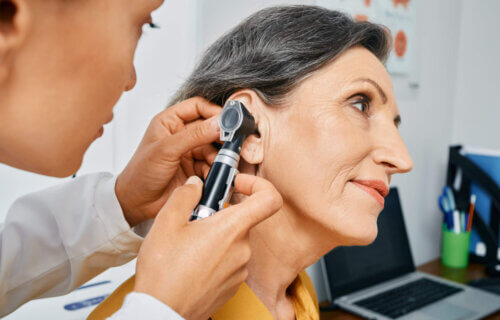ANN ARBOR, Mich. — We all need some silence from time to time, which is why tinnitus tends to be such a frustrating condition. Typically causing a persistent ringing, buzzing, or hissing sound in one’s ear, tinnitus can vary from slightly annoying for some to completely debilitating for others. While tinnitus has historically been tough to cure, exciting new research by a team from the University of Michigan has led to the development of a new treatment device.
Estimates show that up to 15 percent of U.S. adults have tinnitus, and yet only two in five sufferers dealing with tinnitus symptoms chronically actively seek relief. Now, the new study conducted at the University of Michigan’s Kresge Hearing Research Institute suggests relief may soon be on the way.
Susan Shore, Ph.D., Professor Emerita in Michigan Medicine’s Department of Otolaryngology and U-M’s Departments of Physiology and Biomedical Engineering, led research efforts focusing on how the human brain processes bi-sensory information, as well as how these processes can potentially be harnessed for personalized stimulation to treat tinnitus.
Her team’s latest published findings were a double-blind, randomized clinical trial encompassing 99 people living with somatic tinnitus, a specific form of tinnitus characterized by movements such as clenching the jaw, or applying pressure to the forehead, ultimately resulting in noticeable changes in pitch or loudness of experienced sounds. Somatic tinnitus is probably the most common variety of the condition, with close to 70 percent of tinnitus sufferers having this form.
According to Prof. Shore, candidates with bothersome, somatic tinnitus, as well as normal-to-moderate hearing loss, were eligible to participate in this latest project.
“After enrollment, participants received a portable device developed and manufactured by in2being, LLC, for in-home use,” she says in a university release. “The devices were programmed to present each participant’s personal tinnitus spectrum, which was combined with electrical stimulation to form a bi-sensory stimulus, while maintaining participant and study team blinding.”

30 minutes of daily treatment clears up tinnitus
Study authors randomly assigned the volunteers into one of two cohorts. The first group received bi-sensory, or active, treatment first. The second received sound-alone, or control, treatment.
During the first six weeks of the study, participants had to use their devices for a total of 30 minutes daily. Then, over the course of the next six weeks, participants could take a break from daily use, followed by six more weeks of the treatment they did not receive in the beginning of the study.
Prof. Shore adds that every week the participants had to complete the Tinnitus Functional Index, or TFI, and Tinnitus Handicap Inventory, or THI, both of which are questionnaires measuring the impact of tinnitus on individuals’ day-to-day lives.
Researchers noted that when the patients received the bi-sensory treatment, they consistently reported improved quality of life, lower handicap scores, and significant declines in tinnitus loudness. Notably, these effects did not occur among patients receiving sound-only stimulation.
Furthermore, over 60 percent of the participants reported significantly reduced tinnitus symptoms after the six weeks of active treatment, but not after the control treatment. This finding is consistent with an earlier study put together by Prof. Shore’s team. That earlier project found the longer participants received active treatment, the greater the decline in their tinnitus symptoms.
“This study paves the way for the use of personalized, bi-sensory stimulation as an effective treatment for tinnitus, providing hope for millions of tinnitus sufferers,” Prof. Shore concludes.
The study is published in JAMA Network Open.
Editor’s note: This post has received lots of interest from readers who are suffering from tinnitus and are interested in the treatment or future studies. We highly suggest you do not leave a comment disclosing your interest in the device or your condition due to the potential for scammers to take advantage of you and similar privacy concerns. StudyFinds is not affiliated with this research and will never reach out to you to provide information on joining a clinical trial or to connect you with a product. To stay up to date on the Michigan team’s progress, you can sign up for updates by sending an email to [email protected].
You might also be interested in:
- Over-the-counter painkillers raise the risk for tinnitus, study warns
- Live near a busy road? It could lead to a common hearing problem
- Best OTC Hearing Aids In 2023: Top 4 Devices Most Recommended By Audiology Experts


How long does it take Cortexi to start working? I been using it for a week now and it hasn’t helped me at all. And it’s bad
I suffer with debilitating tinnitus. This would be a Godsend.
Greetings Granny,
I emphasize with you.
I also suffer from severe debilitating Tinnitus. At times it drives me to tears and I decend into a bit of madness. Occasionally I’m successful in subduing my noisy head with periods of intense meditation.
Cheers
Trd
Ted, I think you mean empathize, not emphasize.
Has this study concluded or still amongst those trying to find a cure?